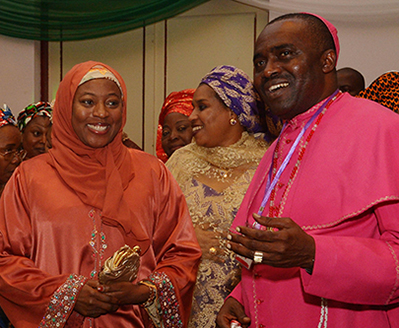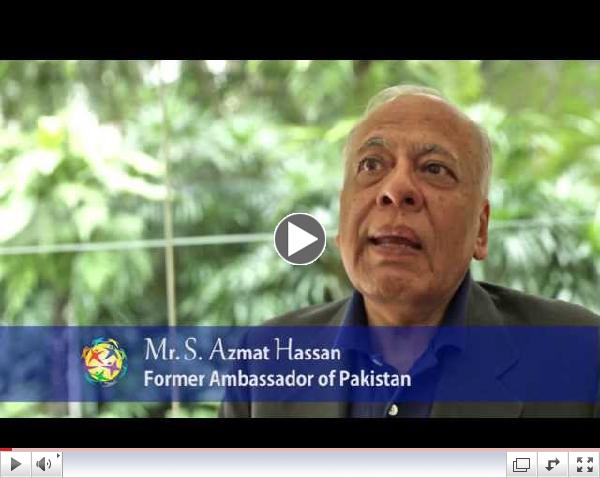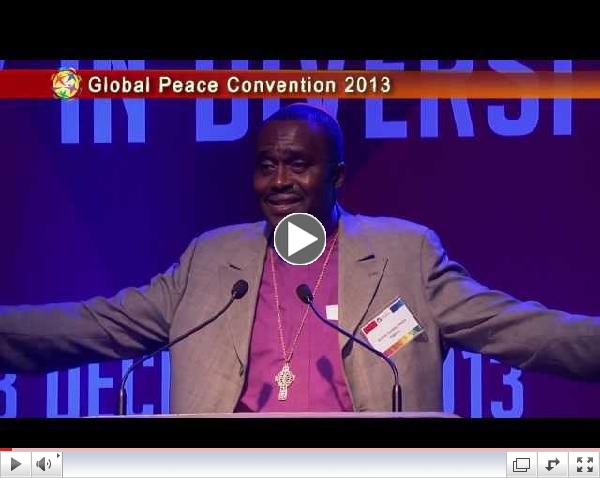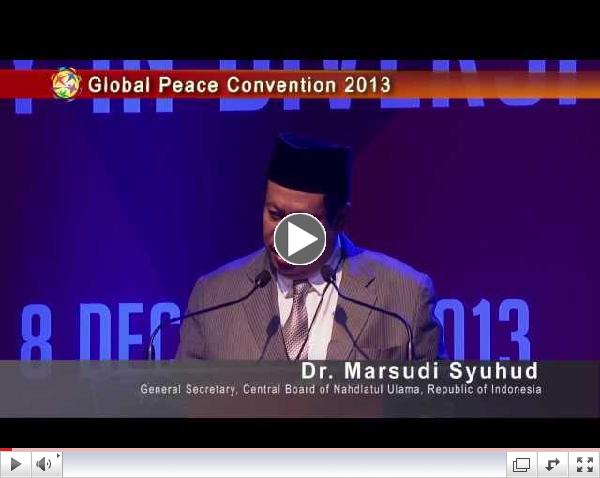|
Recognizing the “imperative need for dialogue among different faiths and religions to enhance mutual understanding, harmony and cooperation among people,” the UN General Assembly adopted a resolution in 2010 designating the first week of February as World Interfaith Harmony Week. The Global Peace Foundation supports the United Nations in its efforts to engage the world’s faith traditions in the urgent work of building sustainable peace in the twenty-first century.
In a message for 2014, UN Secretary General Ban Ki-moon said that faith is an “essential foundation of life for billions of people around the world. It provides strength in times of difficulty and an important sense of community. The vast majority of people of faith live in harmony with their neighbors, whatever their creed.” Faith Traditions: A Resource for Peace Despite the actions of extremists who justify violence in the name of religion–what the Secretary General called “an affront to the heritage and teachings of all major religions”–faith has been instrumental in promoting peace and social change. Movements such as the abolition of slavery in the nineteenth century and India’s independence from British colonial rule and the U.S. civil rights movement in the twentieth century were advanced by faith leaders committed to nonviolence and transcendent spiritual values.
Addressing the 2013 Global Peace Convention in Kuala Lumpur, Malaysia, Global Peace Foundation Chairman Dr. Hyun Jin Moon called the possibility of global religious conflict “one of the most pressing contemporary threats to peace.” He noted how GPF projects are “bringing faith communities to work together to change attitudes and thus behaviors in order to solve social problems and resolve conflict.”
Dr. Moon said faith traditions are a largely untapped resource for peace because they are deeply rooted in their communities and uphold principles and values that reflect the highest human aspirations. “With that in mind,” he told representatives from 40 nations, “I propose the establishment of a faith-based Peace Council at the United Nations to meet the global challenge of identity-based conflict.” “Through such a council the collective wisdom and resources of the world’s great faith traditions can be mobilized to counter the radical elements that are distorting the original spirit of those traditions. We need to recognize the power of religious authority in amplifying the message of peace to local constituents in the most troubled hot spots of the world.” “Nigeria shares your vision of engaging major national, regional, and global interfaith partners with a common commitment to cherished universal principles and values. I enjoin all men and women of good will to join hands in the global effort towards achieving a world where we are all one family under God.” –Nigerian President Goodluck Ebele Jonathan |
|
 Global Peace Convention 2013 Concludes with Kuala Lumpur Peace ResolutionPREAMBLE Acknowledging the sovereignty of Almighty God, the source of inalienable rights and the basis for the equality, dignity and intrinsic value of all people as One Family under God;Whereas throughout the ages, religions and faiths have been the source of peace and hope, providing the spiritual resources necessary to build ethical societies, while at the same time religious rivalries and ethnic conflicts have spread intolerance and violence;.READ THE RESOLUTION Global Peace Convention 2013 Concludes with Kuala Lumpur Peace ResolutionPREAMBLE Acknowledging the sovereignty of Almighty God, the source of inalienable rights and the basis for the equality, dignity and intrinsic value of all people as One Family under God;Whereas throughout the ages, religions and faiths have been the source of peace and hope, providing the spiritual resources necessary to build ethical societies, while at the same time religious rivalries and ethnic conflicts have spread intolerance and violence;.READ THE RESOLUTION |
 African Statesmen, Muslim and Christian Leaders Call for Cross-Sector Peacebuilding and Development at GPF Leadership ConferenceThe Global Peace Leadership Conference, “Moral and Innovative Leadership: Building Sustainable Peace for a Prosperous Future,” convened in a climate of conflict in Nigeria and neighboring states. From the Niger Delta to the Horn of Africa, much of Central Africa has been inflamed by insurgency, ethnic conflict, and lawlessness.READ THE STORY African Statesmen, Muslim and Christian Leaders Call for Cross-Sector Peacebuilding and Development at GPF Leadership ConferenceThe Global Peace Leadership Conference, “Moral and Innovative Leadership: Building Sustainable Peace for a Prosperous Future,” convened in a climate of conflict in Nigeria and neighboring states. From the Niger Delta to the Horn of Africa, much of Central Africa has been inflamed by insurgency, ethnic conflict, and lawlessness.READ THE STORY |
 Multi-faith Forum Emphasizes Leadership, Shared Values in Building Social Cohesion “As an officially Muslim state which protects the rights of all people to practice their religion freely, Malaysia is positioned to have a strong positive role in the rest of the Muslim world,” said James Patton, executive vice president of the International Center for Religion and Diplomacy at a forum, “Faith Leadership for the Greater Good,” in Kuala Lumpur on December 5, 2013.READ THE STORY Multi-faith Forum Emphasizes Leadership, Shared Values in Building Social Cohesion “As an officially Muslim state which protects the rights of all people to practice their religion freely, Malaysia is positioned to have a strong positive role in the rest of the Muslim world,” said James Patton, executive vice president of the International Center for Religion and Diplomacy at a forum, “Faith Leadership for the Greater Good,” in Kuala Lumpur on December 5, 2013.READ THE STORY |
 Global Peace Convention 2013 Calls for Interfaith Cooperation to Mitigate Conflict and Advance Social Cohesion The 2013 Global Peace Convention kicked off in Kuala Lumpur on December 6 with a call from GPF chairman Dr. Hyun Jin Moon for the establishment of a faith-based Peace Council at the United Nations as a major initiative to meet the global challenge of identity-based conflict.READ MORE Global Peace Convention 2013 Calls for Interfaith Cooperation to Mitigate Conflict and Advance Social Cohesion The 2013 Global Peace Convention kicked off in Kuala Lumpur on December 6 with a call from GPF chairman Dr. Hyun Jin Moon for the establishment of a faith-based Peace Council at the United Nations as a major initiative to meet the global challenge of identity-based conflict.READ MORE |












